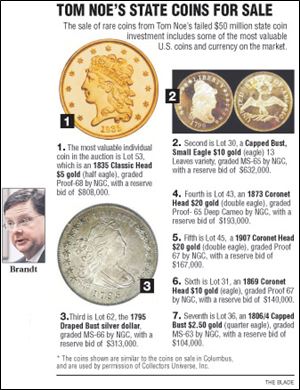
Dealers finding auction of Noe coins 'rare' affair
3/23/2006
Rare-coin dealers say Ohio's ongoing "auction" of coins and currency once managed by Tom Noe is an odd affair, including the videotaping of potential buyers at a secret state highway patrol facility where the coins are located.
It's a long way from traditional venues for high-dollar auctions, such as a posh New York hotel or a staid New England auction house, where letters of credit are honored and the press is allowed inside.
The financial requirements also are "uncustomary," including $10,000 refundable deposits just to see the wares and refundable 10 percent deposits on bids wired directly to the state for the buyers to be taken seriously, said Harvey Stack, owner of Stack's Rare Coins in New York.
Beth Deisher, editor of Coin World, called the ongoing auction a "comedy" that excludes average Joe collectors and dealers from the sale of the rare coins and currency purchased by the state and at the center of a year-long political scandal that has enveloped state government and the Ohio Republican Party.
"It really excludes the average coin collector from bidding. Nobody is going to buy them without seeing the lots," Ms. Deisher said, alluding to the $10,000 requirement.
"For somebody who's living in the coin-collecting world, this is just a comedy playing out on a grand stage."
Ms. Deisher said a bona fide public auction would be open to almost anyone interested and that the energy of true public bidding could have driven up prices, especially for those buyers who might pay a premium just to have a coin connected to the state scandal, she said.
Under the state's system, only specific dealers have been invited to inspect the lots.
The collection represents the largest portion of the coin funds offered for sale since they were liquidated in May amid allegations that Mr. Noe illegally took money from the funds.
More than $17 million in coins are awaiting sale, said William Brandt, whose firm, Development Specialists Inc., is responsible for liquidating the state's investment. About $1 million in coins have been sold in private deals, he said.
The auction items are from the Spectrum Fund, a subsidiary created by Mr. Noe and funded with money from the $50 million in coin funds he managed on behalf of the Ohio Bureau of Workers' Compensation.
The former Toledo-area coin dealer is facing trial on state charges that he stole and laundered more than $3 million. He also faces federal charges that he funneled more than $45,000 into President Bush's re-election campaign.
Spectrum, which is part of the international Escala Group, had possession of the coins and currency before the state seized them as part of its investigations into Mr. Noe and his Capital Coin funds. As a result of its $7.5 million bid, Escala could end up with everything, and none of the other bids honored.
Neither Mr. Brandt nor a spokesman from Escala returned calls to The Blade yesterday.
The auction of rare coins and currency, including a 1835 Classic Head $5 gold (half eagle) coin worth an estimated $800,000, and out-of-circulation $10,000 bills worth $55,000 and up, is at a highway patrol facility off Alum Creek Road in Columbus.
"Coin dealers were contacted and notified where they could go in and bid," said Sgt. Craig Cvetan, a spokesman for the Ohio Highway Patrol. The auction is being handled by the patrol's Office of Investigative Services. And when "high dollar" events are held, security is always tight, he said.
A freelance currency trader named George, who was in Columbus yesterday and did not want his last name revealed for fear of losing a competitive edge when he tries to resell the currency, said he was videotaped as he was taken into a room by himself to inspect the rare paper.
He said he was the only one in the state highway patrol facility. Old patrol cars and uniforms are stored at the facility surrounded by a chain-link fence, he said.
"I sat down and they put up a camera to videotape me. There were two people from the Bureau of Workers' Compensation and then there was a police officer of some type. Videotape for security," he said. "I think they are ultracautious. When you go into the highway patrol facility and go upstairs you go into a room one at a time. It's overkill."
The highway patrol claims the auction room is also an "evidence room," which they claim allows them to exclude the press and other outside observers from observing the ongoing bidding and sale, Ms. Deisher pointed out.
"I got a formal denial to view the auction on the grounds the premises and the room where the coins are kept is an evidence room, and I said, 'But you're selling the evidence to the public.' "
Contact Christopher D. Kirkpatrick
at: ckirkpatrick@theblade.com
or 419-724-6077.